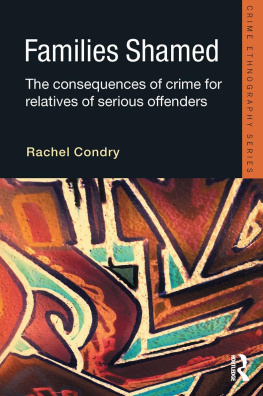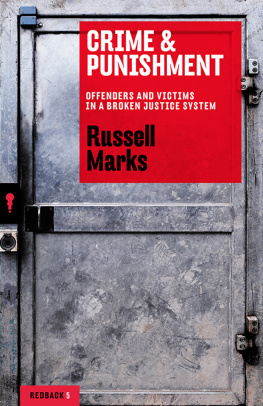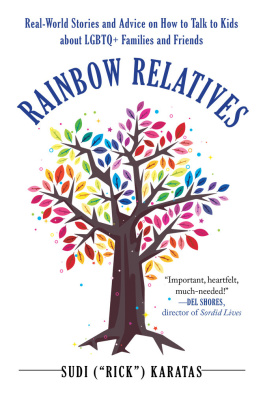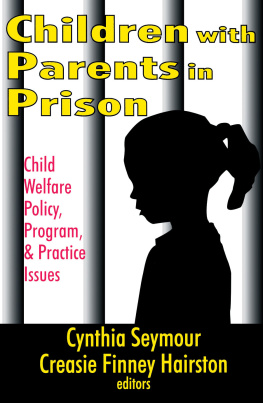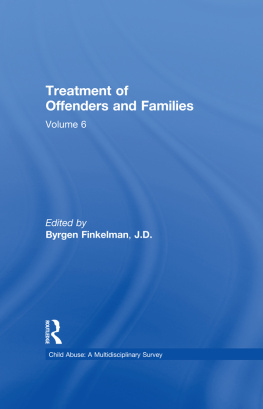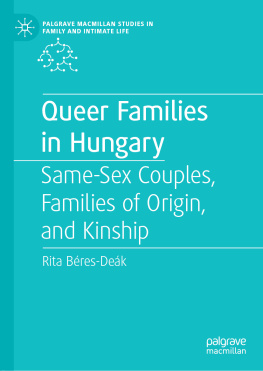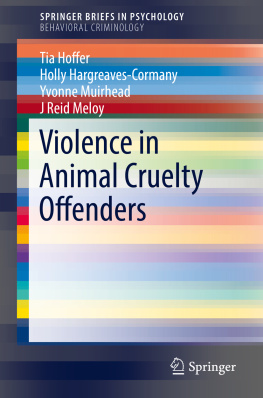CRIME ETHNOGRAPHY SERIES
Series editors: Dick Hobbs and Geoffrey Pearson
Published titles
Holding Your Square: streetlife, masculinities and violence, by Christopher W. Mullins
Narratives of Neglect: community, regeneration and the governance of security, by Jacqui Karn
Families Shamed: the consequences of crime for relatives of serious offenders, by Rachel Condry
Northern Soul: drugs, crime and social identity in the northern soul scene, by Andrew Wilson
Families Shamed
The consequences of crime for relatives of serious offenders
Rachel Condry
First published by Willan Publishing
This edition published by Routledge 2011
2 Park Square, Milton Park, Abingdon, Oxon OX14 4RN
270 Madison Avenue, New York, NY 10016
Routledge is an imprint of the Taylor & Francis Group, an informa business
Rachel Condry 2007
The right of Rachel Condry to be identified as the author of this book has been asserted by her in accordance with the Copyright, Designs and Patents Act of 1988.
All rights reserved; no part of this publication may be reproduced, stored in a retrieval system, or transmitted in any form or by any means, electronic, mechanical, photocopying, recording or otherwise without the prior written permission of the Publishers or a licence permitting copying in the UK issued by the Copyright Licensing Agency Ltd, 90 Tottenham Court Road, London W1P 9HE.
First published 2007
Hardback
ISBN: 978-1-84392-207-0
Paperback
ISBN: 978-1-84392-501-9
British Library Cataloguing-in-Publication Data
A catalogue record for this book is available from the British Library
Project managed by Deer Park Productions, Tavistock, Devon
Typeset by TW Typesetting, Plymouth, Devon
Acknowledgements
First and foremost, my thanks go to all the relatives of serious offenders who participated in the research, both as interviewees and fieldwork participants. I have promised them anonymity and therefore cannot name them individually, but I am grateful for their generous help and hospitality, for sharing details of their personal lives and for having the courage to talk about the difficulties they had encountered. My thanks also go to all of those involved with the running of Aftermath over the years for their openness, support and assistance. A number of people who work with offenders and their relatives gave their time to talk informally and to be interviewed, including the managers of two prison visitors' centres, the directors and staff of various organisations for prisoners and their families, and the staff of the prison visitors' centre in which I worked as a volunteer, and my thanks go to them all. I am grateful to all at Action for Prisoners' Families for their assistance and particularly to Lucy Gampell and Mark Heybourne.
I am indebted to many people for their support and guidance as this project developed. The book is based on doctoral research in the Department of Sociology at the London School of Economics, and particular thanks are due to my supervisors, Paul Rock and Bridget Hutter, for their initial encouragement to embark upon doctoral studies, their constructive feedback on numerous drafts of thesis chapters, and their support and encouragement to develop the thesis into a book. My thanks also go to the academic experts and colleagues with whom I discussed my research as it developed, some of whom read and commented upon earlier drafts of chapters and gave invaluable advice. In particular I would like to thank Stan Cohen, who has been very generous with his time and support and has helped me to see through the fog of motivational accounts theory, and Dick Hobbs, Tim Newburn, and members of the Tuesday crime and deviance research seminar at LSE for helpful discussions and advice. Frances Heidensohn and Ken Plummer examined my PhD thesis and their perceptive comments proved extremely useful when the time came to write this book.
Nicola Lacey and Paul Rock very kindly read a full draft of the book manuscript and, as always, provided incisive and constructive feedback. I am very grateful to Nicola Lacey for her support and astute advice during my time as a Postdoctoral Fellow in the Law Department at LSE, and to Frances Heidensohn for her guidance and encouragement. I would also like to thank Brian Willan, and the editors of the Crime Ethnography book series, Dick Hobbs and Geoffrey Pearson, for their patience and for supporting the publication of this book.
The research received various forms of funding. The book was written during the first year of a British Academy Postdoctoral Fellowship, and I am very grateful to the British Academy for its support. The PhD on which the book is based was funded by an ESRC Research Studentship (award number R0042983451), and the Department of Sociology at LSE provided financial assistance in the first year of my doctoral studies and towards the transcription of some of the interviews.
There are many friends who have been with me through the years and supported me in various ways and I thank them all. I am particularly grateful to Anna Souhami, Stephanie Hayman, Amanda Goodall and Andrew Oswald, Martina Klett-Davies, and Lucy Mackenzie for their interest in the development of the book and for useful discussions.
Finally, my thanks go to all my family, and particularly to Dave, Isaac and Martha; to my parents, Gregory and Catherine Condry; and to my sister Abi Condry. I am especially grateful to Dave who has seen this project evolve from the beginning and been unstinting in his patience and support, which in recent years has included holding the domestic fort and looking after the children when work ran into extra time.
Rachel Condry
London School of Economics
2007
Introduction
Lionel Shriver's 2005 Orange Prize-winning novel We Need to Talk About Kevin is narrated by the mother of a serious offender, Eva Katchadorian. Eva's son Kevin has killed seven of his fellow students, a teacher and a cafeteria worker in a shooting at his high school. The book consists of a series of letters to her estranged husband Franklin in which she looks back to their life before they were parents, the 16 years they had with Kevin before he committed the crime, and how her life had changed afterwards. In her letters, Eva recounts Kevin's upbringing and attempts to unpick what might have led Kevin to kill. The book does not provide an easy answer to this question and Eva's account is brutally honest about the problems she perceived Kevin to have since his birth, her own lack of maternal feeling towards Kevin, her failings as a mother, and her husband's denial of their problems and determination to construct the family as happy and normal. The question of why Kevin did what he did is cleverly left open for the reader to decide (the back cover of the book reads: Nature or Nurture: what makes a monster?) and many of the reading group questions that appear at the end of the book are constructed around this central issue.
The book and the character and magnitude of the crime it describes are distinctly American and Eva's predicament, without disclosing how Shriver's book unfolds (several key elements are revealed towards the end), has some significant features that differ from the accounts of relatives of offenders on which my book is based. However, there are parallels between Eva's account and the stories told by the relatives that I met. Eva attracts blame as Kevin's mother, and this blame is expressed in covert and overt ways. Her neighbours regard her with suspicion; her brother won't let his children anywhere near her; and in the eyes of her father-in-law, she says: Kevin had proven defective, and I was the manufacturer (p. 139). During one night a month after Kevin's crime, gallons of crimson paint are quietly splashed across the front of her house. Eva is sued in the civil court for being a negligent parent in a case brought by the mother of one of the victims (this fictional account has a basis in reality; in the US, a number of school shootings have resulted in similar cases against the perpetrator's parents).

